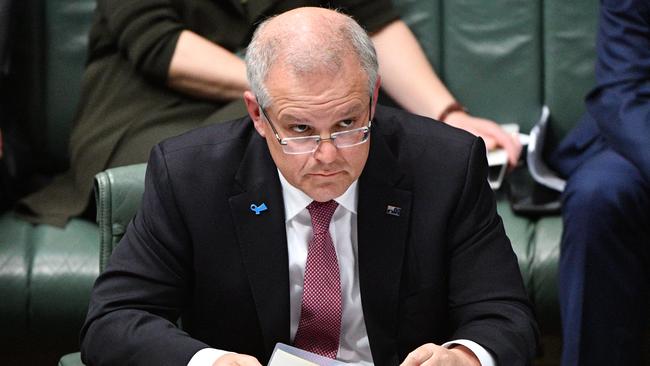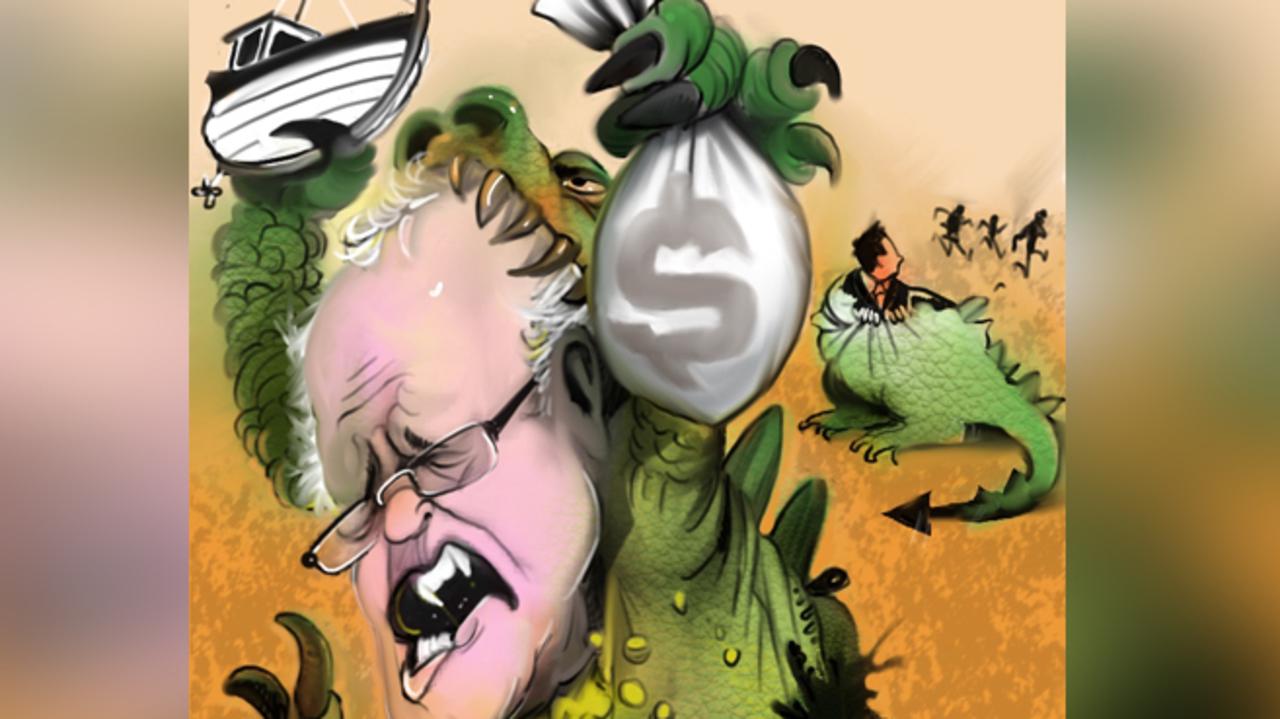Morrison defines himself, but what about the Liberal Party?

Scott Morrison has done a reasonable job of defining himself as Prime Minister. His much greater, infinitely more difficult, task is to redefine the Liberal Party and his government.
Morrison can give no real answer to why he is there, other than he is because he is, unless he wants to incite civil war. His exasperation with the question showed yesterday when he told Bill Shorten directly, and indirectly everybody else, to get over it, so desperate is he for clear air. He doesn’t have that much time to convince people that not only is he up to the job but his government has a plan to tackle cost-of-living pressures and that it is worthy of their vote.
He has to get people to believe the government is not a haven for apprentice bullies or embittered, intolerant old men. In the face of the backstabbing, the front stabbing and the personal abuse of the past few years, he needs not only to convince decent, capable women that a political career is not hazardous to their mental or physical wellbeing but men too.
Morrison has done his best to set the right tone, to try to explain who he is, what he stands for and what values he wants the Liberal Party to uphold. In some respects that’s the easy bit. Wait until he has to get down to tin tacks to fashion a new energy policy to replace the one he has just buried, the one that was meant to lower prices.
Killing off the national energy guarantee had nothing to do with getting power prices down, which Morrison says is Angus Taylor’s chief mission as Energy Minister. It had everything to do with appeasing the hard Right of his party, which used it as the weapon of choice to destroy Malcolm Turnbull’s leadership.
After arguing for months it was an essential part of the strategy to give business certainty, thereby ensuring reliability, which would then help keep prices down and reduce emissions, it now appears it was not. So what is? I asked Innes Willox, chief executive of the Australian Industry Group, who has taken a keen interest in these matters, to briefly describe the government’s energy policy. “The simple answer is I don’t know,” he replied.
Maybe Labor will get around to pressing Morrison for an answer, although it is as vulnerable and as culpable in the climate wars. It doesn’t have a good answer to how it will keep a lid on prices. The likeliest outcome is Labor will pick up the NEG and call it something else. The acronym wars also threaten to continue unabated.
Then wait until Morrison has to decide how far to go to enshrine religious freedoms, to strike the right balance between freedom on the one hand and religion on the other.
His opponents listened carefully to his speech on values in Albury. They picked up on what they say were coded messages to Christian communities, which they believe will play well. But he has to tread carefully on the issue of religious protections in the wake of the legalisation of same-sex marriage. Too far and he risks allowing one group of Australians to legally discriminate against another. Too little and he looks silly after calling for protections to be beefed up, by legislation if necessary.
“I think if you don’t have freedom of your faith, of your belief — and in whatever religion that is — then you don’t have freedom in this country at all,” he said. Attorney-General Christian Porter, appealing for common ground, made clear yesterday — to loud hear-hears from the PM — that doing nothing is not an option.
The scene is set for another testing time for the Liberals’ broad church. And for the community. Key Labor figures, ever more confident of victory, speculate the government could fall apart by Christmas. It has an element of wishful thinking to it, although if the government loses the Wentworth by-election it will be at the mercy of the independents. The government is counting on Cathy McGowan, who was close to Turnbull, to be as well disposed to Morrison, and hoping others such as Rebekha Sharkie will follow her example.
Labor’s wider point, that the Liberals have squandered the one real advantage they had over the ALP — stability in government — is spot-on, no matter how superficially appealing the new leader is. Labor has been there, done all that, and is now luxuriating in the schadenfreude.
Two polls this week show Morrison’s early success on style and presentation has failed to translate into votes. Both Newspoll and Essential showed Morrison was preferred prime minister and ahead of the Opposition Leader on personal measures. More concerning, however, is the Newspoll that showed the Coalition trailing Labor by 12 points in two-party preferred terms, while Essential puts the deficit at eight points. So regardless of whether they like Morrison more than Shorten, even more people are prepared to vote Labor since August 24.
Despite statements to the contrary by a quarter of the female members of his partyroom that bullying occurred, as Tanya Plibersek helpfully pointed out, Morrison is trying to put a lid on the issue, claiming there is no bullying as such inside the Liberal Party, and even if there was the whips were there to provide pastoral care for MPs. That doesn’t seem to have worked too well recently, so his responses have disappointed some of the women brave enough to call it out.
He has, however, intervened to get at least one more Liberal woman into parliament.
Andrew Bragg got the message loud and clear that Morrison did not want him to run in Wentworth. Morrison decided having a female candidate was the party’s best chance of holding on to the seat after internal polling showed a woman would lift the vote. Bragg commissioned his own polling, which confirmed it.
With a dwindling number of women in the parliamentary party, and the difficulty the Liberals face in enticing them to run, they were lucky there were two women already in the race, Katherine O’Regan and Mary-Lou Jarvis. O’Regan was the frontrunner, but even she could struggle given the toxic environment following Turnbull’s demise, particularly if the high-profile Kerryn Phelps nominates.
Liberals believe Bragg’s running of the Yes campaign for Liberals and Nationals in the same-sex marriage plebiscite was partly behind a dirty campaign against him. Bragg was taken aback by the viciousness of some of the claims, which Liberal sources say were found not to be true, and yesterday they were expressing confidence he would win a seat in the Senate.


